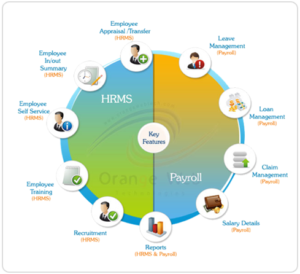Human Resource Management System (HRMS)
What is HRMS?
 A HRMS (Human Resource Management System) is a combination of systems and processes that connect human resource management and information technology through HR software. A HRMS may help to revolutionize a workplace.
A HRMS (Human Resource Management System) is a combination of systems and processes that connect human resource management and information technology through HR software. A HRMS may help to revolutionize a workplace.
The automation of repetitive and time consuming tasks associated with human resources management frees up some of the companies most valuable employees and allows the focus to shift to culture, retention, and other highly impactful areas.
HRMS or HRIS?
The term HRMS is sometimes used synonymously with HRIS (Human Resource Information System), but an HRIS is really a type of HRMS. Functionally, however, there is no real difference in the type of systems offered going by one title or the other. At one time, a HRMS was a more complete automated solution to human resources management than software labeled as HRIS or even HCM, but rebranding by many companies has worked to make the different software titles generally indistinguishable.
A Modern Approach to HR
Selecting a HRMS to handle HR activities is a trademark of the modern company, there are few successful companies in any industry that do not have some sort of automation in place for HR tasks at this juncture. Mobile accessibility has further worked to transform the landscape of HR, putting information and task management at the fingertips of employees and managers. HRMS has helped to effectively break down bureaucracy and “flatten” many organizations.
Functions of HRMS Systems
The function of the human resources department involves tracking employee histories, skills, abilities, salaries, and accomplishments. Replacing certain processes with various levels of HRMS systems can distribute information management responsibilities so that the bulk of information gathering is not delegated strictly to HR. By allowing employees to update personal information and perform other tasks, information is kept more accurate and HR professionals are not bogged down.
Each module performs a separate function within the HRMS that helps with information gathering or tracking. HRMS modules can assist with:
- Managing payroll
- Recruitment and onboarding
- Gathering, storing, and accessing employee information
- Keeping attendance records and tracking absenteeism
- Performance evaluation
- Benefits administration
- Learning management
- Employee self-service
- Employee scheduling
- Analytics and informed decision making
Assessing the Need for a HRMS Solution
Before a company makes a decision regarding the selection of a HRMS solution, it is important for the management team to identify the needs of the company, its processes, and goals for both long term and short term. It is essential to the success of the project to deeply involve the HR professionals in the process. Depending on the size and structure of the company, it may be helpful to have an organization-wide meeting or to select representatives from each department to discuss HRMS goals and options.